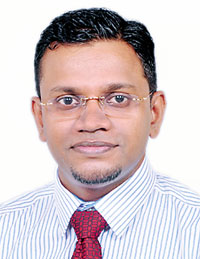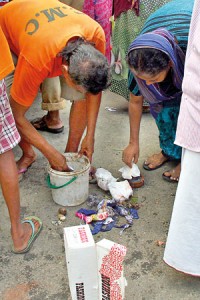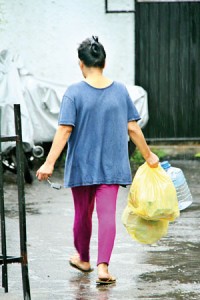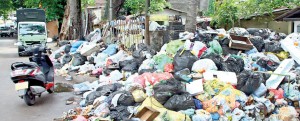News
Govt. waste deep in its (mis)management and disposal
View(s):By Sandun Jayawardana
Piles of garbage still remain in street corners as workers toil to segregate garbage left behind by residents.
Workers, under strict orders to clear up the piles as soon possible, used their bare hands to sort out the garbage dumped three to four days to a week ago. The process of ridding mounds of garbage from Colombo has been hindered by people dumping unsegregated garbage throughout the city.
Even in areas where the garbage has been cleared, it piles up later, as people dump unsegregated garbage there again, according to officials. The Ministry of Provincial Councils (PC) and Local Govt (LG) said the Environment Police had charged 2,336 persons with illicit dumping of garbage, in a single day.

Buddhika Muthukumarana
The practice of illicit dumping reached crisis levels after garbage collection virtually ground to a halt, following the collapse of the Meethotamulla garbage dump in April. Garbage collection in the following weeks have been sporadic at best, compelling many to dump their garbage in “convenient” locations, due to reluctance or inability to keep garbage in their homes, a source involved in the Govt’s garbage disposal efforts pointed out.
In a desperate bid to reduce the practice, police have now been directed to arrest anyone found dumping garbage illicitly.
Police had arrested over 100 persons on charges of illegal dumping within the past week, Colombo Municipal Council (CMC) Commissioner, V.K.A. Anura, told the Sunday Times. According to Mr Anura, both, people living withn Colombo, as well as outside CMC limits, were among those arrested. “Legal action will be taken against them,” he added. Last Sunday, Prime Minister Ranil Wickremesinghe directed the CMC to immediately remove garbage from the city. Accordingly, a renewed effort was made this week to collect garbage from households, but large mounds of garbage in certain areas remain.
Western Province Chief Minister (CM) Isura Devapriya claimed that, while the usual practice is for workers not to collect unsegregated garbage, instructions were given to remove unsegregated garbage from areas where they had piled up. “We have no choice now, as there are piles of garbage throughout Colombo,” he said. The CM urged people to assist by segregating their garbage.
Despite these assurances, CMC workers in some areas were still refusing to remove unsegregated garbage piles.
The present strategy, however, seems to be arresting those engaged in illegal dumping, while removing garbage and dumping it on lands outside the city. This practice is set to continue for the foreseeable future.

Unenviable task: Sorting out unsegregated waste
CM Devapriya, for his part, acknowledged that segregating garbage alone and dumping garbage in designated areas will not resolve the issue. “Projects aimed at generating Refuse Derived Fuel (RDF) would be started shortly,” he said. “One of these projects at the Karadiyana dump site would commence by August but, would take at least two to three years for these projects to be completed,” he revealed.
“Work also needs to be done in removing the “garbage mounds” located in parts of the WP,” he further admitted. “Measures to gradually downsize these ‘mounds’ and dispose of the garbage safely will also be taken in the coming weeks, he assured.
The Govt is also taking steps to forcefully manage the garbage crisis. This week, Cabinet approved a proposal presented by Prime Minister Ranil Wickremesinghe on “Waste disposal within the CMC and suburbs.” The proposal called for disposal of waste on recognized lands, under environmental laws, judicial action to prevent public protests against waste disposal, waste to be disposed only after grading, provide necessary tools for LG authorities, and increase general public’s awareness to resolve related issues in the above areas.

No plastic please: A resident walks away after garbage collectors refuse to take the segregated plastic waste
Meanwhile, a National Task Force formed by the Ministry of PCs and LG to manage the twin garbage and dengue crises, held its first discussion this week, to monitor islandwide waste management procedures 24-hours a day.
According to a source involved in the Govt’s waste management process, one complication is that, there are so many agencies involved in the matter. These include the Central Environment Authority (CEA), the Ministry of Environment, the Ministry of PCs and LG, the Ministry of Megapolis and Western Development, the WPC and the WP Waste Management Authority.
“It’s a case of having too many cooks,” the source said. “Sometimes, various agencies put forward different solutions to the same issue. With so many agencies involved, the process is frustratingly complicated,” it was observed. Different LG authorities are also still adopting different approaches to garbage collection. “In some areas, they insist on segregating garbage. In others, workers are collecting all waste together,” the source pointed out.

The big stink: Colombo city. Pix by Indika Handuwala
| Recyclers see greater dangers from thick plastic bagsThe Sri Lanka Recyclers Association says it has presented some proposals which it claims will assist the Government to address the garbage crisis. Buddhika Muthukumarana, an SLRA director, told the Sunday Times that some ideas presented so far by the Government were counterproductive. The group proposes to produce all plastic PET (polyethylene terephthalate) water bottles in white, rather than blue. It would be more cost-effective. “Blue adds nothing to the bottle except to make it more attractive to the customer,” he said. The group also opposes a ban on lunch sheets and instead suggests these be made made using biodegradable material. “We don’t believe it would serve anyone to suddenly ban lunch sheets without a viable cheap alternative,” Mr Muthukumarana said. He pointed out that manufacturers in Sri Lanka who export lunch sheets to some countries are using biodegradable material. Attempts to compel the industry to produce even thicker plastic shopping bags will not help to reduce their use, the group argues. Under current regulations, plastic bags must be thicker than 20 microns. There are some suggestions that this should be increased to 40 microns as the extra cost of the bag would deter users, Mr Muthukumarana said. “This will be a big mistake, as it will overnight, double the amount of raw material being used to produce the bags. There will be more polythene, not less.” He believes that plastic bag users will not be discouraged if there are no alternatives. Researchers at The Earth Policy Institute, say the energy needed to make 12 plastic bags could drive a car for a mile. The recyclers’ group also says the public should not misinterpret the identification codes seen on plastic items. This is an international code used to identify the type of plastic resin from which the product is made. “For example, PET bottles have the number 1 on them while plastic plates, which are made from polypropylene, have the number 5. Many people have misunderstood this code to mean that you can only use these items once or twice but in reality, they can be recycled multiple times.” Mr Muthukumarana explained. He urged the public to separate household garbage to help in the recycling efforts. | |

